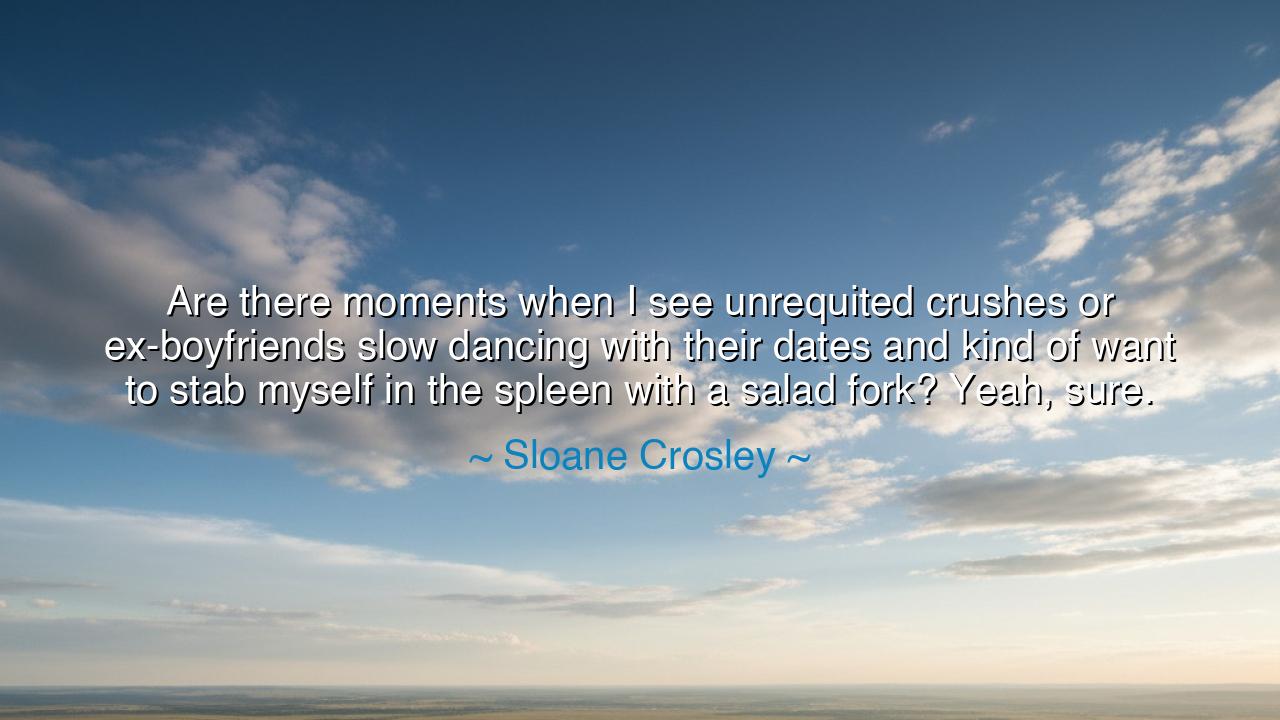
Are there moments when I see unrequited crushes or ex-boyfriends
Are there moments when I see unrequited crushes or ex-boyfriends slow dancing with their dates and kind of want to stab myself in the spleen with a salad fork? Yeah, sure.






When Sloane Crosley confessed, “Are there moments when I see unrequited crushes or ex-boyfriends slow dancing with their dates and kind of want to stab myself in the spleen with a salad fork? Yeah, sure,” she did not speak as a comedian mocking pain, but as a philosopher cloaked in humor. Her words, sharp and self-aware, are not about romance alone—they are about the strange dignity of being human. Beneath the laughter lies a truth the ancients knew well: that even the wisest hearts ache, that the pangs of unrequited love and the shadows of memory can stir both agony and amusement within us. In jest, she revealed a truth as old as longing itself—that to feel jealousy or loss is not weakness, but the mark of a soul still alive, still capable of wonder and attachment.
Her quote belongs to that lineage of wisdom where humor softens the blows of existence. The ancients might have called it the art of balance—the ability to laugh while one’s heart trembles. For what is life but a series of paradoxes? We crave love, knowing it can wound us; we celebrate others, while quietly mourning what might have been. Crosley’s image—absurd yet vivid—of stabbing oneself with a salad fork speaks to that small, internal violence of comparison and regret. It is not the grand tragedy of epic lovers, but the quiet, familiar ache of seeing happiness that once seemed within reach now belonging to another.
Throughout history, this emotion has been the companion of poets and warriors alike. Sappho, the great poetess of Lesbos, once wrote of the torment of seeing her beloved speaking with another: “He seems to me equal to the gods, that man who sits beside you.” Her anguish, though wrapped in beauty, is the same as Crosley’s—a mingling of envy, admiration, and pain. Centuries later, Crosley offers the same confession, not in the language of lyric tragedy, but in the vernacular of modern wit. The heart’s torment has not changed; only the instruments of our expression have evolved—from lyre to laughter, from elegy to essay.
What makes Crosley’s reflection powerful is not her suffering, but her honesty. She does not deny her jealousy; she names it, exposes it to light, and in doing so, transforms it. To admit envy without bitterness is an act of courage. The ancients would have called it self-knowledge—the first step toward wisdom. She acknowledges the sting of rejection, but also the absurdity of her own reaction, reminding us that self-awareness is the balm that turns pain into perspective. In laughter, we reclaim our dignity. To laugh at our wounds is to show that they do not own us.
This is the art of emotional resilience, the practice of turning inward storms into songs of survival. Life will often confront us with scenes that reopen old scars—a love lost, a chance missed, a dream that belonged to someone else. In those moments, Crosley’s humor offers a lesson older than irony itself: that we are not defined by what we feel, but by what we do with our feelings. Do we let jealousy consume us? Or do we laugh, breathe, and carry on, wiser and lighter? The one who can smile in the face of envy is not denying pain, but mastering it.
Consider the story of Eleanor Roosevelt, who once said, “No one can make you feel inferior without your consent.” She, too, lived through heartbreak and humiliation, yet found a way to turn sorrow into service. Where others would have lingered in bitterness, she rose into purpose. This is the journey from the salad fork of despair to the sword of self-command. It is the transformation Crosley gestures toward: the movement from reaction to reflection, from self-pity to self-possession.
So, children of feeling and folly, take this lesson to heart: to be human is to sometimes envy, to ache, to laugh at your own foolishness. But let not those fleeting pangs harden your heart. Let them instead remind you of your capacity to love, to hope, to care deeply. When you find yourself watching another’s dance, do not stab your heart with envy—applaud softly, smile, and remember your own rhythm awaits. For humor is the wisdom of the wounded, and laughter, when born of honesty, is the sound of a heart still beautifully alive.






AAdministratorAdministrator
Welcome, honored guests. Please leave a comment, we will respond soon